
Can Hamas’ Resistance be Deterred by the Assassination of Haniyeh?
Can Hamas’ Resistance be Deterred by the Assassination of Haniyeh?
By: Khursheed Alam Dawood Qasmi
Haniyeh: A Sincere Leader:
The chairman of the political bureau of Hamas, Mr. Ismail Abdul Salam Ahmad Haniyeh, has been martyred. His martyrdom, I believe, will further strengthen the foundation of the Palestinian cause. As a reward for his martyrdom, he will be granted the reward of eternal life from his Lord, InShaAllah. His martyrdom took place far from his homeland but it is neither the first nor the last martyrdom for the noble cause of Al-Aqsa Masjid and the liberation of Palestine. Countless Palestinian people and leaders have been martyred, both within Palestine and abroad. The Palestinian cause has lost a truly sincere leader, and the heart of every believer is filled with grief and sorrow. However, this doesn’t mean that the line of leadership is broken. Many Palestinian leaders have been martyred in the past, yet the leadership has always remained intact. Palestine remains a very fertile land in this regard- when one leader departs, another rises to take the place. As a poet once said:
“The land that is nourished by the blood of martyrs,
Is rich and ever-green.”
Martyr Haniyeh: A Talented and Gifted Leader:
Martyr Haniyeh was a talented and gifted individual who articulated his thoughts effectively, listened carefully to others, and accommodated diverse perspectives while demonstrating flexibility according to the time and situation. He was the recognized face of the Palestinian group’s international diplomacy, playing a crucial role in negotiations during the recent conflict. An expert in influencing adversaries, he skillfully negotiated the release of hundreds of Palestinian prisoners in exchange for a single Israeli prisoner. He declared Quds a red line and never compromised on the Palestinian cause. His dedication to the liberation of Al-Aqsa, Quds, and Palestine, as well as the freedom of the Palestinian people, was unwavering. Just two days before his martyrdom, on July 29, 2024, he called upon the people of Arab, Islamic, and other nations to take to the streets in support of the oppressed people of Gaza and those imprisoned in Israeli jails on August 3. He believed that the Israeli occupation had been committing genocide against the people of Gaza for nearly ten months, with the number of prisoners dying in Israeli jails rising alarmingly. In light of these circumstances, he urged protests on August 3. Little did he know that even before this date, millions would gather to attend his funeral prayers—first in Tehran on August 1, and then in Doha on August 2.
Travel to Iran:
Martyr Haniyeh travelled to Iran to participate in the inauguration ceremony of the newly elected Iranian President, Masoud Pezeshkian. He attended the event and met with the newly elected president and various world leaders. On the night of July 30, 2024, he went to retire to the guest house in the IRGC compound in Northern Tehran, where he typically stayed during his visits. Reports indicate that terrorists targeted his residence with a guided missile on July 31 at approximately 2 a.m. local time. Mr. Haniyeh and his bodyguard, Waseem Abu Shaban, were martyred in this attack. Iranian state TV reported the news early that morning, and the Hamas administration also confirmed the martyrdom of its esteemed leader. People around the world were left to grapple with the shocking reality of this news.
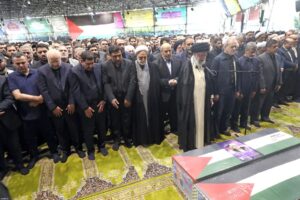
Funeral Prayer in Tehran:
On August 1, Iran’s Supreme Leader Ayatollah Ali Khamenei led the funeral prayer for Martyr Haniyeh and his bodyguard at Tehran University grounds. The newly elected Iranian president, ministers, government officials, and a large number of people attended the funeral. Many attendees held pictures of Martyr Haniyeh and waved Palestinian flags. Iran declared three days of mourning in honour of the fallen leader.
Funeral Prayer and Burial in Doha:
The bodies of Martyr Haniyeh and his bodyguard were flown from Tehran to Doha, Qatar, on the night of Friday, August 2, 2024. The second funeral prayer was performed at Imam Muhammad Bin Abdul Wahhab Masjid in Doha after the Friday prayer, led by Mr. Khalil Al Hayyah, a senior member of the Hamas Politburo. Before the prayer, the masjid’s Imam, Shaykh Hasan al-Marrikhi, delivered a deeply moving sermon on the topic of martyrdom, paying tribute to Martyr Haniyeh. In his sermon, he declared Palestine as the “mother of all issues” for the Muslim Ummah and praised Qatar’s steadfast position on this issue. I wish that other Arab and Islamic countries would have treated this cause with the same significance.
From early morning, people began gathering at the masjid, with the streets of Doha soon flooded with mourners. Palestinian flags filled the air as people chanted Takbeer, shouting “Allahu Akbar.” The flags waved everywhere, creating a powerful atmosphere of unity and defiance. The Emir of Qatar, Sheikh Tamim bin Hamd Al-Thani, his father, Sheikh Hamd bin Khalifa, the predecessor of the martyr, Mr. Khaled Mashal, as well as dignitaries from several countries, including Turkey, Afghanistan, and Iran, attended the funeral in large numbers alongside the public. Martyr Haniyeh was laid to rest in the Lusail Royal Cemetery in Doha. As his body was lowered into the grave, the air resounded with Takbeer and cries for the liberation of Palestine. Funeral prayers in absentia were also held across many countries around the world.

Hamas Reaction:
Following the assassination of its leader, Ismail Haniyeh, Hamas issued a statement mourning the loss of a “brother, leader, martyr and Mujahid.” The statement described the attack as a treacherous Zionist raid on his residence in Tehran, after he had attended the inauguration of the new Iranian president. The statement further declared: “The blood of our leader Ismail Haniyeh, mingling today with the blood of Gaza’s children, women, youth, and elders, alongside the blood of our fighters, underscores that the resistance and its leadership are at the heart of the battle with their people. This precious blood will not be shed in vain, but will light the path to liberation. The enemy will pay for its aggression in Gaza, the West Bank, and within its borders, wherever our fighters reach, by Allah’s will.” Prominent Hamas leader Musa Abu Marzouq condemned the assassination as a cowardly act that would not go unpunished, asserting that Israel will not achieve its goals by killing Haniyeh. Senior Hamas official Sami Abu Zuhri, in an interview with Reuters, described the assassination as a “grave escalation” meant to break the will of Hamas and its people but insisted it would fail in achieving its objectives.
Reaction of World Leaders:
The Palestinian state news agency WAFA reported that President Mahmoud Abbas condemned the assassination as a cowardly act and a serious escalation, calling for Palestinian unity and resilience in the face of Israeli occupation.
Abdus Salam Haniyeh, son of Martyr Ismail Haniyeh, blamed Israel and the U.S. for his father’s assassination. After surviving four previous attempts on his life, Abdus Salam noted that his father had finally achieved the martyrdom he always desired. He affirmed that the assassination would not deter the resistance from fighting for freedom.
Turkish President Recep Tayyip Erdogan strongly condemned the assassination on X, calling it a “despicable attempt” to undermine the Palestinian cause and resistance. He linked Haniyeh’s assassination to previous attacks on leaders like Sheikh Ahmed Yassin and Abdul Aziz al-Rantisi, stressing that “Zionist barbarism will once again fail.” Erdogan called for unity in the Islamic world to end the oppression in Gaza and reaffirmed Turkey’s commitment to supporting a sovereign Palestinian state with East Jerusalem as its capital. Turkey declared a national day of mourning, and its flag was flown at half-mast, even at the Turkish embassy in Tel Aviv.
Iranian President Masoud Pezeshkian vowed that the “occupiers will regret their cowardly act,” stressing that the bond between Iran and Palestine would only grow stronger. He reaffirmed Iran’s commitment to defending the oppressed and ensuring that the “terrorist occupiers” would regret their actions.
Qatar condemned the assassination, expressing concern that it would escalate chaos in the region and harm the prospects for peace. In a statement, Qatar’s Foreign Ministry called the assassination “a dangerous escalation” and a “flagrant violation of international and humanitarian law.
Russia also condemned the assassination. Foreign Ministry deputy spokesman Andrey Nastasyin warned that the act could have severe repercussions for the region, noting that it would disrupt ongoing negotiations between Hamas and Israel aimed at establishing a ceasefire in Gaza.
China, through Foreign Ministry spokesman Lin Jian, echoed this sentiment, condemning the assassination and expressing concern about potential regional instability. Beijing pledged to closely monitor the situation.
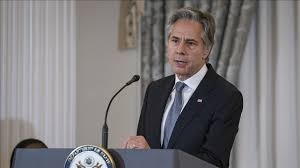
US Secretary of State Antony Blinken’s Statement:
US Secretary of State Antony Blinken stated that the United States had no involvement in the assassination of Ismail Haniyeh. During an interview in Singapore, Blinken remarked, “This is something we were not aware of or involved in. It’s very hard to speculate.”
UN Security Council Emergency Session on Haniyeh’s Assassination:
On 31st July 2024, the UN Security Council convened an emergency session at the request of representatives from Iran, Russia, Algeria, and China, following the assassination of Haniyeh. During the session, council members condemned the assassination of the Hamas leader. Iran’s UN Representative Amir Saeid Iravani emphasised that while Tehran had exercised maximum restraint, it reserved the right to respond decisively to the assassination. He urged the UNSC to impose sanctions on Israel, describing the attack as part of a longstanding pattern of Israeli terrorism targeting Palestinians and their supporters.
Algeria’s envoy to the UN, Amar Bendjama, warned of looming catastrophe, stating that Israel’s actions violated international law and Iranian sovereignty. “This is not merely an attack on one man,” Bendjama asserted. “It is a vicious assault on the very foundations of diplomatic relations, state sovereignty, and the global order.” Russia’s Deputy Representative Dmitry Polyansky echoed these concerns, highlighting the potentially dangerous regional consequences of the assassination.
OIC Emergency Meeting on Haniyeh’s Assassination:
On 7th August 2024, the Organisation of Islamic Cooperation (OIC) held an emergency meeting in Jeddah to address the assassination. The OIC concluded with merely a condemnation of Israeli actions and held Israel fully responsible for Haniyeh’s assassination. Mr. Ibrahim Taha, Secretary General of the OIC, condemned the war crimes of Israel. He called it a “crime of aggression, a flagrant violation of international law and a serious infringement of the sovereignty of Iran.” The OIC stressed that the assassination of Haniyeh during his stay in Tehran constituted a severe breach of international law, the UN Charter, and an attack on Iran’s “territorial integrity and national security.” It also urged the UN Security Council to impose an immediate and comprehensive cease-fire on Israeli aggression and “ensure adequate and sustainable access to humanitarian aid throughout Gaza Strip.”
New York Times Report on Haniyeh’s Assassination:
Let’s consider how the assassination of Ismail Haniyeh was reported in prominent newspapers, shedding light on how the enemy might have gained access to his residence. While the Iranian official statement claims Haniyeh was killed by a guided missile, The New York Times published a report on 1st August 2024, suggesting otherwise. According to its report, “The explosion that killed Ismail Haniyeh and his bodyguard early on Wednesday (31st July) was caused by a sophisticated, remote-controlled bomb smuggled into Haniyeh’s room at the Tehran guesthouse two months prior.” According to the Times, this indicated the blast was unlikely to have been caused by a missile strike, as had been reported. A missile would also have difficulty breaching Iran’s air defenses, the newspaper said. Iran and Hamas clear have said that Israel is responsible for this assassination. The New York Times report also mentioned that several US officials had reached a similar “assessment,” with Israeli intelligence briefing the US and other Western governments on the details of the operation immediately after the attack.
The Telegraph’s Report on Haniyeh’s Assassination:
British newspaper The Telegraph reported that Mossad agents were behind the assassination of Ismail Haniyeh, planting an explosive device in his bedroom months in advance. The device was detonated remotely when it was confirmed that Haniyeh was inside the guesthouse. The report highlighted that Haniyeh had stayed at the guesthouse multiple times before.
Axios Report:
US-based outlet Axios echoed these findings, reporting that Mossad was responsible for planting the bomb, which was a “high-tech device that utilised artificial intelligence.” The operation, which took months of planning, involved extensive surveillance of the compound before the assassination could be executed.
Internal Traitors and Haniyeh’s Assassination:
The assassination of such a significant guest and prominent leader is no minor incident. There are varying opinions regarding how it happened. One theory suggests that internal traitors holding high-ranking positions were involved. Without their cooperation, it would have been difficult to carry out the assassination of Haniyeh. Media outlets such as “The Telegraph” and “The New York Times” have reported that the explosive device responsible for Martyr Haniyeh’s death was planted by agents within the Islamic Revolutionary Guard Corps (IRGC), allegedly hired by Israel’s intelligence agency, Mossad. The Iranian investigative authorities now believe Mossad recruited members from the Ansar al-Mahdi security unit. An IRGC source told “The Telegraph” that an internal investigation is ongoing. According to a report by “The New York Times”, several Iranian intelligence and military officers have been detained in connection with the investigation, and staff from the guesthouse where Haniyeh was staying has also been arrested.
Haniyeh’s martyrdom reveals the disturbing presence of corruption at the highest levels in Iran. Iran’s security system appears vulnerable. If the enemy could assassinate such an important guest in a military-controlled guesthouse, it signals that they could strike Iran at any time. This is a wake-up call for the Iranian government. The enemy seems to have penetrated deep into Iran’s defences, and the country must now exercise heightened vigilance and reassess its internal security measures. The Iranian investigative agency must urgently address key questions: Who orchestrated Haniyeh’s assassination, and how did the perpetrators manage to succeed? In my view, the quicker these questions are answered, the better it will be for Iran’s security.
Choosing Iran for Haniyeh’s Assassination:
Martyr Haniyeh is not the first leader to be targeted by the Zionist enemy. Before him, many Palestinian leaders were assassinated both inside Palestine and in other countries. The choice of Iran as the location for this assassination seems strategic. The enemy may have intended to weaken the strong ties between Hamas and Iran, one of the few countries with which Hamas maintains a solid relationship. By orchestrating the assassination of its leader on Iranian soil, the enemy may hope to sever these relations. Additionally, the assassination may also be aimed at deepening the divide between Sunni and Shia factions, further destabilising unity in the region.
Birth of Martyr Haniyeh:
Ismail Abdus Salam Ahmad Haniyeh was born on January 23, 1963, in the Al-Shati refugee camp in the Gaza Strip. His family had fled from the village of Al-Jaurah in the occupied district of “Asqalan” (now called Ashkelon, after the name was changed by the Zionist state) due to persecution. Martyr Haniyeh married his cousin, Amal Haniyeh, at the age of 16. Together, they had 13 children, including eight sons and five daughters.

Education:
Ismail Haniyeh received his primary education at a school run by the United Nations Relief and Works Agency (UNRWA) for Palestinian refugees. He completed his secondary education at Azhar Institute and later enrolled at the Islamic University of Gaza in 1987, where he earned a bachelor’s degree in Arabic Language and Literature. During his time at university, he was an active member of the Student Union Council. In 1993, he was appointed Dean of the Islamic Bloc at the Islamic University of Gaza, having previously held numerous other positions there.
Haniyeh in Prison and Politics:
From the beginning of his involvement in the Palestinian cause, Haniyeh was a committed political activist and endured the hardships of imprisonment. The Israeli occupation authorities first arrested him in 1987, during the outbreak of the Palestinian Intifada, and he spent 18 days in jail. He was arrested again in 1988, spending six months in prison. In 1989, Haniyeh was arrested a third time for his association with Hamas, and this time he spent three years behind bars. He was later exiled, along with other Hamas leaders, to Marj al-Zahoor in southern Lebanon, where they spent a year in exile. After the Oslo Accords in 1993, he returned to Gaza and was appointed head of Sheikh Ahmed Yasin’s office in 1997. From that time onward, Haniyeh became deeply engaged in Palestinian political affairs.
Following the death of Yasser Arafat, democratic elections were held in Palestine on January 25, 2006. Hamas won a majority in the elections and subsequently formed the government on March 25, 2006. Ismail Haniyeh was appointed as Prime Minister, serving for about a year. However, on June 14, 2007, Palestinian Authority President Mahmoud Abbas dismissed Haniyeh’s government and appointed Salam Fayyad as Prime Minister. Despite this, Hamas continued to govern the Gaza Strip under Haniyeh’s leadership. On May 6, 2017, Haniyeh was elected Chairman of Hamas’s Political Bureau, succeeding Khalid Mashal. Since 2023, Haniyeh had been residing in Doha, the capital of Qatar. On May 20, 2024, International Criminal Court (ICC) Prosecutor Karim Khan announced that he had submitted a request for an arrest warrant against Israeli Prime Minister Benjamin Netanyahu, Defense Minister Yves Gallant, and Ismail Haniyeh. This move placed both the alleged perpetrator and the victim within the scope of the ICC’s investigation.
Martyrdom of Haniyeh’s Family Members:
Before his own martyrdom, Ismail Haniyeh had already witnessed the loss of many family members in the struggle for the liberation of Al-Aqsa Masjid and Palestine. On November 10, 2023, one of his granddaughters was martyred in an Israeli airstrike. Ten days later, his eldest grandson was also martyred. On April 10, 2024, during Eid-ul-Fitr, his three sons —Hazam, Muhammad and Amir— were travelling by car with their five children to visit relatives. Israeli occupation forces bombed their car in Al-Shati camp, Gaza, killing all of them, including the children. Following the attack, the Israeli authorities claimed that the operation was planned by their Internal Security Agency. Shortly thereafter, Haniyeh’s sister, Zehr Haniyeh, was also martyred in an airstrike. The Israeli forces didn’t stop there; they bombed Haniyeh’s house in Al-Shati refugee camp, reducing it to rubble.
It was widely believed by the enemies that after the loss of his sister, sons, grandsons, and granddaughters, Haniyeh would be overwhelmed by grief, lose heart, and retreat from his stance. Many expected him to be defeated by these tragedies and forced to show leniency in his fight against the occupying forces. However, Haniyeh, a steadfast and brave leader, didn’t waver. Despite these personal losses, he never compromised on the cause of Al-Aqsa Masjid, Jerusalem, and Palestine. Until his martyrdom, he remained firm in his resistance, refusing to betray the sacrifices of millions of martyrs who gave their lives for the noble cause of Palestine and Al-Aqsa.
The Enemy’s Failed Ploy:
The enemy’s ploy and strategy to weaken Hamas by assassinating Haniyeh, hoping to halt its resistance, ultimately failed. Hamas is no stranger to such losses, having previously endured the martyrdom of many of its towering leaders. These include Sheikh Ahmed Yassin (March 22, 2004), Dr. Abdul Aziz Al-Rantisi, known as the “Lion of Palestine” (April 17, 2004), Imad Hassan Ibrahim Aql (November 24, 1993), Jamal Mansour and Jamal Salim (January 20, 2001), Mahmoud Abu Hanoud (November 23, 2001), Salah Shahadah (July 22, 2002), Engineer Ismail Abu Shanb (August 21, 2003), Saeed Syam, Minister of Home Affairs in the Hamas government (January 15, 2009), Ahmed Jabari (November 16, 2012), and Raed Attar, Muhammad Abu Shamla, and Muhammad Barhoum (August 21, 2014), all of whom were killed in Israeli airstrikes. Despite these losses, the Israeli occupation forces have been unable to break Hamas psychologically or stifle its resistance. By electing Yahya Sinwar as the new Chairman of the Hamas Political Bureau, the movement demonstrated its resilience and sent a strong message to the enemy: Hamas will not be defeated by the loss of one leader. Hamas’ resistance can’t be deterred by the assassination of Ismail Haniyeh. The resistance will not falter. Its members are prepared to face the enemy with even greater strength. Their unwavering commitment to continue sacrificing for the liberation of Al-Aqsa Masjid, Jerusalem and Palestine remains resolute. As the martyred leader Haniyeh once said: “We are a people who love death as much as our enemies love life.”
You May Also Like
 Breaking News
Breaking NewsGenocide in Gaza and Global Silence
Genocide in Gaza and Global Silence By: Khursheed Alam Dawood Qasmi Donald Trump’s Middle...
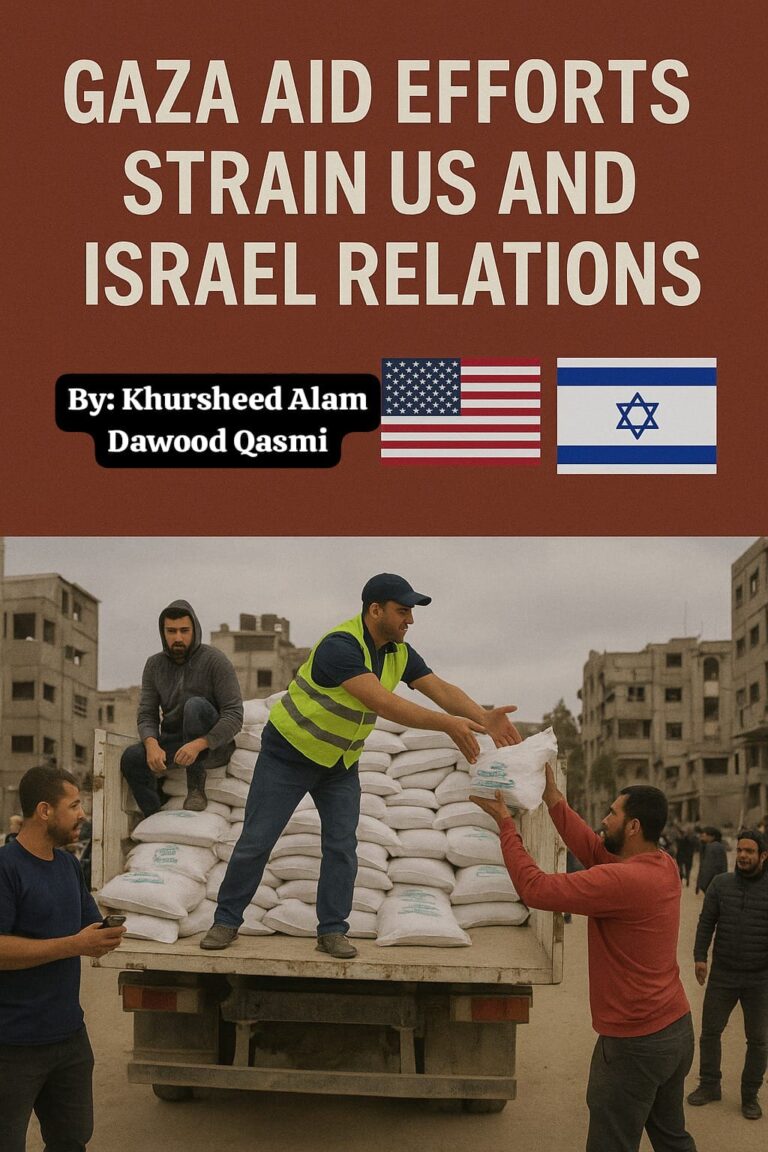 Breaking News
Breaking NewsGaza Aid Efforts Strain US and Israel Relations
Gaza Aid Efforts Strain US and Israel Relations By Khursheed Alam Dawood Qasmi Why...
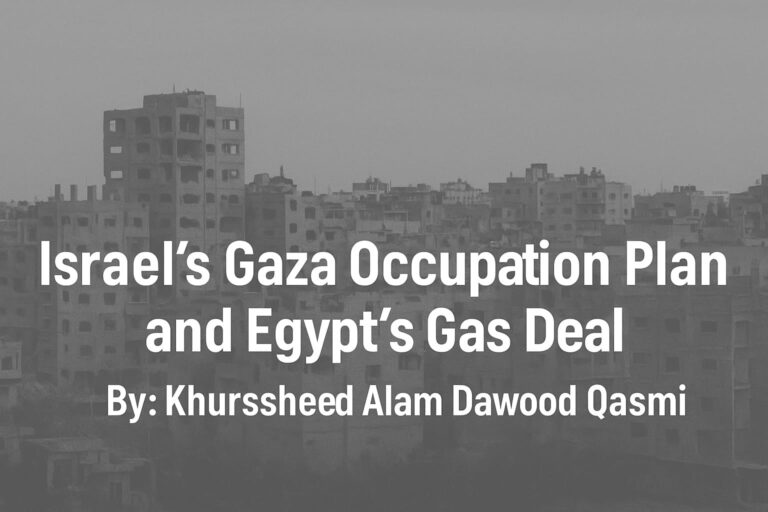 Gulf Countries
Gulf CountriesIsrael’s Gaza Occupation Plan and Egypt’s Gas Deal
Israel’s Gaza Occupation Plan and Egypt’s Gas Deal By: Khursheed Alam Dawood Qasmi Israeli...
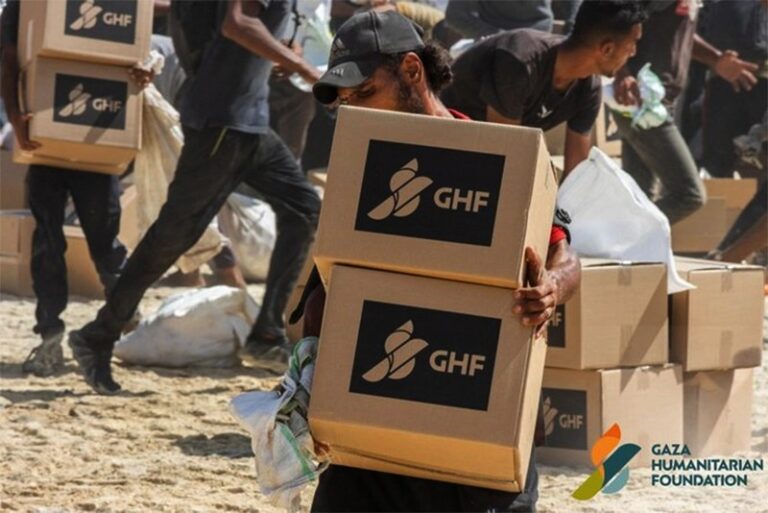 Gulf Countries
Gulf CountriesGHF’s Aid Operations and Attacks on the Affected People
GHF’s Aid Operations and Attacks on the Affected People By: Khursheed Alam Dawood Qasmi...
 Europe
EuropeIsrael-Iran War and the Massacre in Gaza
Israel-Iran War and the Massacre in Gaza By: Khursheed Alam Daoud Qasmi Israel’s Attack...
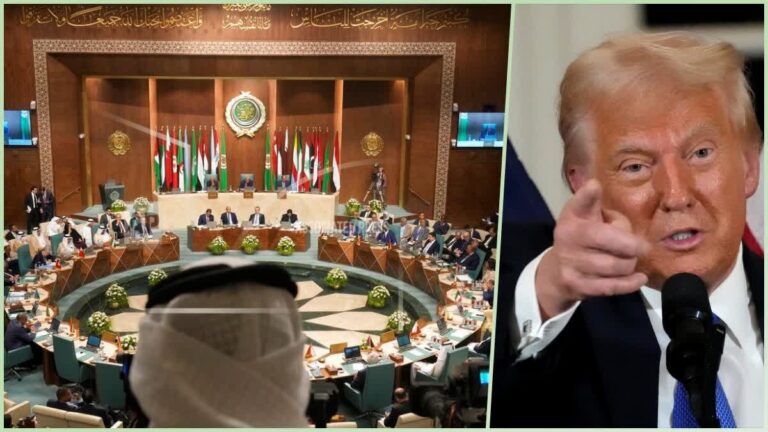 Gulf Countries
Gulf CountriesTrump's Plan to Occupy Gaza and Its Harmful Effects
Trump's Plan to Occupy Gaza and Its Harmful Effects By: Khursheed Alam Dawood Qasmi...

Comments (1)
Leave a Comment
I don't think the title of your article matches the content lol. Just kidding, mainly because I had some doubts after reading the article.